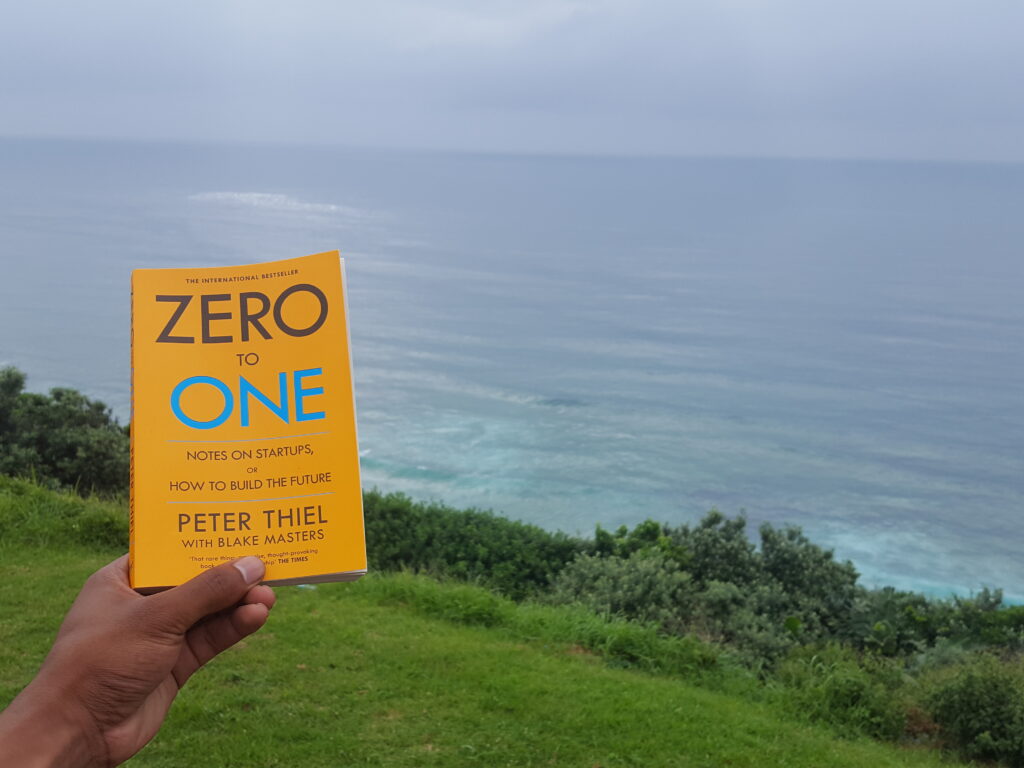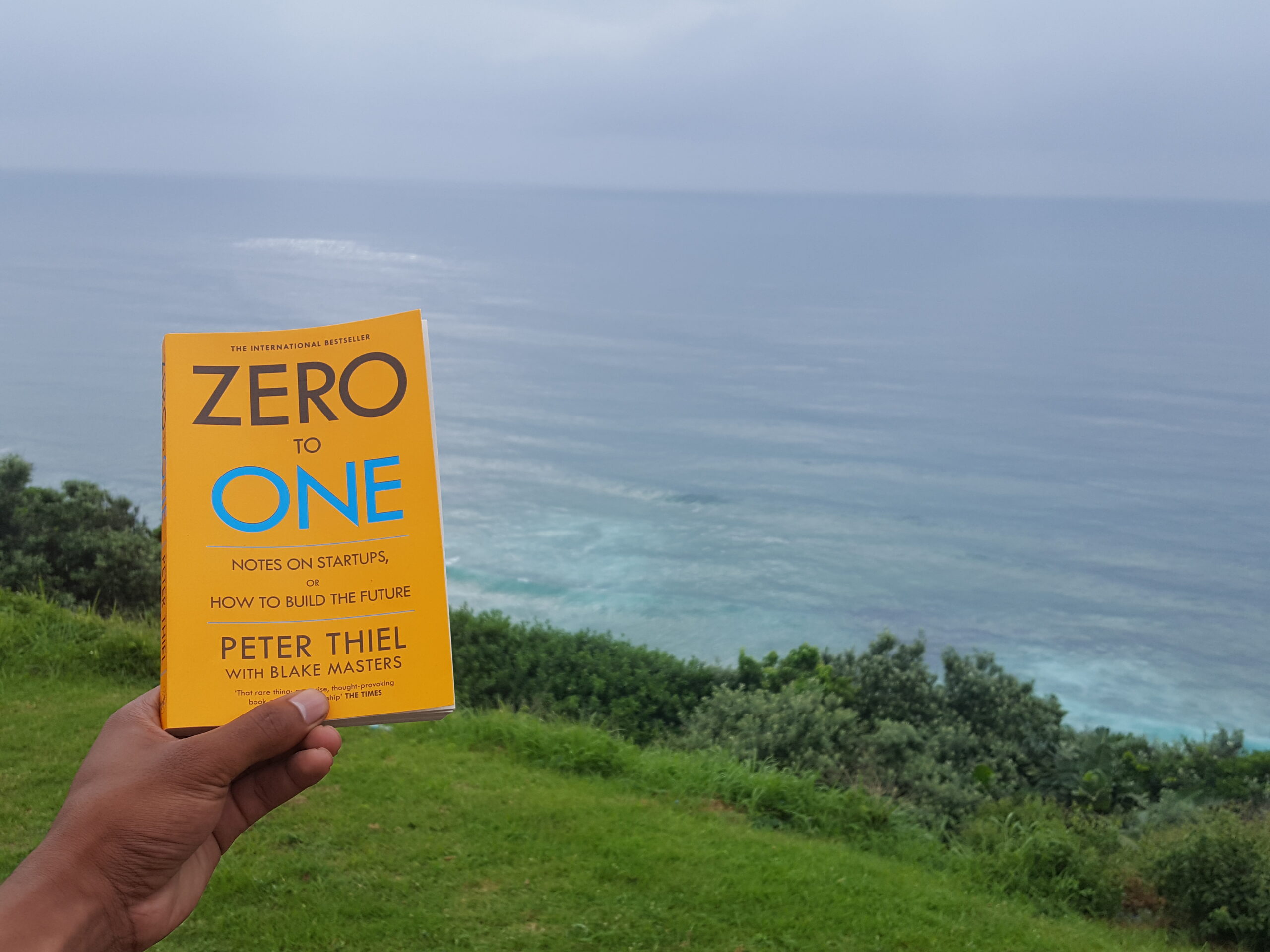
Exploring Contrarian Wisdom: My Journey Through Peter Thiel’s Zero to One
Growing up in the South Durban Basin in South Africa, I learned early on that if I wanted something, I had to find a way to get it myself. In high school, I hustled my way to making money, doing everything from buying and selling electronics to completing assignments for classmates at a fee. I sold chips and sweets, and even offered to buy food for colleagues, keeping the change as my remuneration. This drive to earn more money wasn’t just about survival—it was about challenging the circumstances I was born into. It was this spirit of opposition to the status quo that made the idea of being a contrarian so appealing to me. It gave me a sense of purpose, a quasi-identity rooted in the belief that I could shape my own destiny by thinking differently.
A Contrarian Perspective That Resonates
When I first picked up Peter Thiel’s Zero to One, I was immediately drawn to his contrarian mindset. Growing up in an environment where conformity was often the safest route, I found Thiel’s willingness to challenge conventional wisdom both refreshing and empowering. Authors like Ayn Rand and other figures who championed individualism and contrarian thinking had already influenced me, so Thiel’s perspective felt like a natural extension of ideas I was already exploring. He wasn’t just advocating for thinking differently; he was offering a blueprint for how to do it successfully in a world that often rewards conformity.
The Provocative Question: “What Important Truth Do Very Few People Agree With You On?”
One of the most striking moments in Zero to One is when Thiel asks, “What important truth do very few people agree with you on?” This question is more than just thought-provoking—it’s a challenge to dig deep and uncover beliefs that might set you apart from the crowd. For me, this question encapsulated the essence of what it means to be a contrarian. It’s not just about being different for the sake of it; it’s about having the courage to believe in something even when everyone else thinks you’re wrong. This idea isn’t just theoretical—it’s practical advice for anyone looking to innovate or create something new.
Rethinking the Past to Build the Future
Thiel emphasizes that “the first step to thinking clearly is to question what we think we know about the past.” This idea resonated deeply with me. Growing up, I often felt that the institutions and beliefs surrounding me were immutable. But as I started to challenge these ideas, I realized that many of them were outdated and needed to be rethought. Thiel’s point that old ideas crumble in the face of innovation is a powerful reminder that to achieve something great, we must be willing to let go of the past and reimagine the future.
Lessons from the Dot-Com Era
Thiel’s reflections on his time running PayPal during the dot-com boom were particularly insightful. He delves into the business models that thrived in San Francisco during the late 1990s and early 2000s, a time when the internet was still an uncharted frontier. PayPal’s strategy of paying people to sign up was revolutionary at the time, reflecting the boldness and risk-taking that characterized the era. The lessons from the dot-com
crash that followed seemed, at first glance, to reinforce conventional wisdom: 1. make incremental advances, 2. stay lean and flexible, 3. improve on the
competition, and 4. focus on product, not sales.
But Thiel, ever the contrarian, argues that the opposite is often true. He suggests that boldness should be embraced over triviality, that a bad plan is better than no plan at all, and that competitive markets, rather than being the ideal, can actually destroy profits. His assertion that sales matter just as much as product was a revelation to me, highlighting the often-overlooked importance of marketing and distribution in the success of a business. These insights turned conventional business wisdom on its head and reinforced the idea that true innovation requires thinking beyond the established norms.
Thiel’s perspective on the dot-com era offers a unique lens through which to view business strategy. While many saw the crash as a failure of overreach and hubris, Thiel sees it as a lesson in the necessity of bold, unconventional thinking. His experiences during this time highlight the importance of daring to be different and the value of pursuing audacious goals, even when the risks are high. For me, this was a powerful reminder that true success often requires going against the grain, challenging existing beliefs, and daring to take risks that others might shy away from.
Creating Value vs. Capturing Value
Thiel’s exploration of the difference between creating value and capturing value is another highlight of the book. He puts a unique spin on the Anna Karenina principle by claiming that “all happy companies are different,” emphasizing that successful companies differentiate themselves through unique business models. This idea tied into my admiration for those who were doing well; I wanted to understand what set them apart so I could replicate their success. Thiel’s analysis of monopolies versus perfect competition further deepened my understanding of what it takes to build a company that not only survives but thrives.
The Hard Truth About Social Entrepreneurship
One of the most challenging ideas in Zero to One is Thiel’s critique of social entrepreneurship. He argues that the concept is a myth, as most attempts to combine societal benefit with corporate interests end up failing. This was a tough pill to swallow, especially since I’ve always believed in the potential of businesses to do good in the world. But Thiel’s argument forced me to confront the realities of the marketplace and the difficulties of balancing altruism with profitability. It was a sobering reminder that while good intentions are important, they must be matched with sound business strategies to succeed.
Founders as Scapegoats
Thiel’s discussion on founders being the perfect scapegoats because they are extreme and contradictory figures is both sobering and empowering. It reminded me of the courage it takes to lead and the responsibility that comes with it. In a way, this resonated with my own journey—opposing the institutions I grew up around and making difficult choices that set me apart from my peers and even my family. Leadership, especially in the entrepreneurial world, is about embracing this role and using it to drive meaningful change.
Conclusion: The Power of Books in Shaping Destiny
Reading Zero to One was more than just an intellectual exercise for me—it was a validation of the path I’ve chosen. Thiel’s contrarian perspective, his emphasis on questioning the past, and his insights into business and innovation have profoundly influenced my understanding of what it takes to succeed in today’s world. As someone who has always sought to challenge the status quo and think differently, Thiel’s ideas felt like they were written specifically for me.
Books like Zero to One have played a crucial role in my development, helping me understand the broader principles that govern the financial machine we live in. Growing up with so little, I realized early on that to have control over my destiny, I needed to understand the world of economics and finance. I believe that if you can’t understand money, you’ll never have it—or at least, you’ll never have enough of it. Books hold the keys to our destiny, offering the tools and knowledge needed to achieve anything we set our minds to.
For anyone looking to challenge their thinking, to innovate, or to simply understand the world of startups and business better, Zero to One is a must-read. It’s a book that will push you to question what you know, think boldly, and take the necessary risks to create something truly unique. No one philosophy is perfect or absolute, but if you start down this road, you will be amazed at what you can accomplish.
